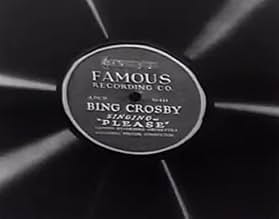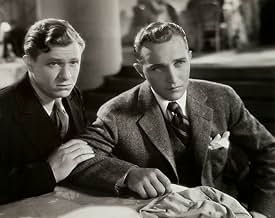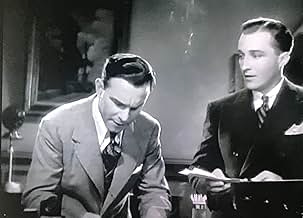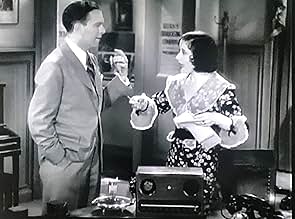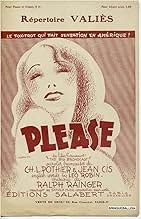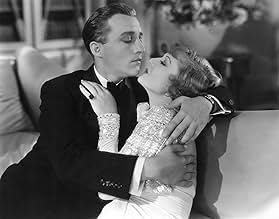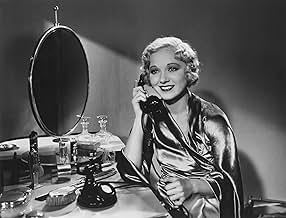Agrega una trama en tu idiomaA radio-singer, Bing Crosby, is none-too-concerned about his job, and an affair with Mona leads to his dismissal. When it appears Hornsby is getting and paying a lot of attention to his fian... Leer todoA radio-singer, Bing Crosby, is none-too-concerned about his job, and an affair with Mona leads to his dismissal. When it appears Hornsby is getting and paying a lot of attention to his fiancée, Anita Rogers, station manager Leslie McWhinney buys the station, gives Hornsby his jo... Leer todoA radio-singer, Bing Crosby, is none-too-concerned about his job, and an affair with Mona leads to his dismissal. When it appears Hornsby is getting and paying a lot of attention to his fiancée, Anita Rogers, station manager Leslie McWhinney buys the station, gives Hornsby his job back, and goes on a honeymoon with Anita.
- George
- (as Burns and Allen)
- Gracie
- (as Burns and Allen)
- Dirección
- Guionistas
- Todo el elenco y el equipo
- Producción, taquilla y más en IMDbPro
Argumento
¿Sabías que…?
- TriviaBing Crosby's song "Please" became the inspiration for John Lennon to write the Beatles' first hit "Please, Please Me"
- Citas
Anita Rogers: I love somebody else.
Leslie McWhinney: Whoever he is, he's a fool if he can't see you.
Anita Rogers: [after a long pause] It's Bing.
Leslie McWhinney: Bing?
- Créditos curiososFilm opens with loudspeakers, then segues to lobby cards depicting several of the featured stars "Live".
- ConexionesEdited into The Great Radio Comedians (1972)
- Bandas sonorasMinnie the Moocher
Written by Clarence Gaskill, Cab Calloway and Irving Mills
Performed by Cab Calloway
The slight plot revolves around Bing Crosby (Bing Crosby), the most popular singer at WADX Radio Station in New York City. Due to his constant lateness, Mr. Clapsaddle (George Barbier), the upset sponsor, forces radio manager, George Burns (George N. Burns) to have Crosby fired. Anita Rodgers (Leila Hyams), Burns' secretary, silently loves Bing, though he fails to notice her. Bing is engaged to marry dancer, Mona Lowe (Sharon Lynn), the one responsible for his irresponsible behavior. While celebrating his final days as a bachelor with his friends at a speakeasy, Bing sees a newspaper article of Mona eloping with a broker and jilting Crosby. After befriending an equally depressed Leslie McWhinney (Stuart Erwin), a Texas oil man jilted by the girl he loves and being taken for $100,000 by a gold-digging widow, Bing invites the poor soul to his apartment where he plans a double suicide. Bing's plot fails with the arrival of Anita, Leslie's girlfriend from back home, with the news of Mr. Burns agreeing to give Bing his job back now that he's no longer engaged to be married. As Bing arranges to find Leslie a job at the studio, warrant officers turn up to close down the station. With his remaining $900,000, Leslie buys the radio station and becomes its president. All goes well until Mona Lowe returns to Bing life again, making him irresponsible once more. Here lies love.
With old and new tunes (by Leo Robin and Ralph Rainger) combined for THE BIG BROADCAST, the musical program features that of "Dinah" (sung by Bing Crosby); "Speakeasy" (sung by telephone operators, Major, Sharp and Minor); "Here Lies Love" (sung by Arthur Tracy); "Here Lies Love" (reprised by Crosby); "Please" (Crosby); "Tiger Rag" (sung by the Four Mills Brothers); "Please" (reprise by Crosby); "I'm the Drummer" (sung by Vincent Lopez); "Trees" (sung by Donald Novis); "Crazy People" (sung by The Boswell Sisters); "It Was So Beautiful" (sung by Kate Smith); "Kicking the Gong Around" (sung by Cab Calloway); and "Please" (finale). At one point in history, a motion picture soundtrack of THE BIG BROADCAST was available through Sandy Hook records in the 1980s, but the movie itself thus far has never been distributed to home video.
The comedy team of George Burns (radio manager) and Gracie Allen (the receptionist) incorporate their vaudeville routines as part of the plot on two separate occasions rather than during the on-screen radio broadcast. The movie also acquires the brief glimpses of actual radio announcers (James Wallington, Donald Ball, William Brenton and Norman Brokenshire) introducing the upcoming acts. Paramount pulls no stops on broad comedy, whether cartoonish, the use of high speed projection, laughing toy horses or even allowing material reminiscent to those silent comedy era through situations enacted through radio theme music but no inter-titles as the hapless Leslie tries in vain to acquire a Bing Crosby record and prevent himself from either losing or damaging it.
Commonly presented on broadcast television in the 1970s and public television a decade later, the only known cable TV showing in latter years for THE BIG BROADCAST happened to be from American Movie Classics (1990-91). Due to its enormous popularity and career launching of Bing Crosby, Paramount repeated its success with follow-up sequels in name only: THE BIG BROADCAST OF 1936 (1935), 1937 (1936) and 1938 (1938), with the 1938 edition being notable for the feature film introduction of Bob Hope, Crosby's on-screen partner in seven installments to "The Road to" comedy series from 1940-1962. Regardless of surreal plot and situations, THE BIG BROADCAST is nostalgic in its own little way, and should still be of entertaining value even today. One final note: Why do many references refer to Crosby's role as Bing Hornsby? He's addressed and billed as Bing Crosby throughout the entire story. And now, The Big Broadcast. (**1/2)
- lugonian
- 15 nov 2000
- Enlace permanente
Selecciones populares
Detalles
- Fecha de lanzamiento
- País de origen
- Idioma
- También se conoce como
- The Crooners
- Locaciones de filmación
- Productora
- Ver más créditos de la compañía en IMDbPro
- Tiempo de ejecución1 hora 28 minutos
- Color
- Relación de aspecto
- 1.37 : 1
Contribuir a esta página


